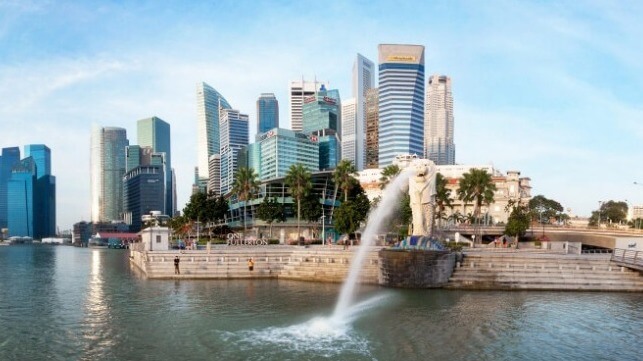Singapore Says Ammonia Requires Study and 2023 Pilot is Not Realistic

The Maritime and Port Authority of Singapore (MPA) is calling into question reports suggesting that the port is ready to conduct the first transfers of ammonia in a trial to support the development of bunkering processes for ammonia as a marine fuel. The agency, which oversees and regulates the port's operations including the world’s largest marine bunker market, says it does not view a timeline before the end of 2023 for the first pilot tests of ammonia as realistic.
“The MPA welcomes studies, pilots, and collaborations that contribute to the maritime sector’s decarbonization efforts,” they wrote in a statement released on May 1. “These efforts must, however, be accompanied by thorough validation of the studies, calibration of models to assess the impact of incidents, and rigorous procedures to ensure the safety of the port, port community, and ship crew.”
While only citing the media coverage and not the authors of the study in question, the MPA is calling out the statements that “the risks identified for conducting (ammonia-related) pilots in the Port of Singapore were found to be low or mitigable, thus paving the way for a pilot project.”
“These views do not represent the assessment of MPA and other government agencies – the timeline before end-2023 is not realistic,” the MPA said in response to the media coverage of the release of a report commissioned in January 2022 by the Global Centre for Maritime Decarbonisation (GCMD) and its appointed consultant, DNV Maritime Advisory supported by management consulting firm Surbana Jurong and the Singapore Maritime Academy at the Singapore Polytechnic. The sponsors announced that they had completed their study identifying more than 400 potential risks and assessed the technically feasible of operational concepts. While acknowledging the toxicity and associated risks of green ammonia the study concluded the safety risks can be mitigated.
While reiterating its commitment to decarbonizing the maritime sector and international shipping, the MPA is saying the results of the newly announced study should not prejudge the outcomes of its independent efforts, including further assessments and standards development by the MPA and the relevant agencies. Pilots and trials they noted require comprehensive preparations, safety procedures, bunkering standards, operation and risk assessments, and safety audits.
Various ammonia-related studies the MPA notes were presented during Singapore Maritime Week. They highlighted that the Maritime Energy & Sustainable Development Centre of Excellence, a jointly funded program by the Singapore Maritime Institute and Nanyang Technological University, concluded in its presentation that more dispersion and release studies are needed to better understand the impact of a potential ammonia release under various environmental conditions and scenarios. That study contends that available mitigation and response measures will require further work.

that matters most
Get the latest maritime news delivered to your inbox daily.
Professor Lynn Loo, CEO of the Global Centre for Maritime Decarbonisation, had said in presenting the findings of their study that their group is “aiming for the first transfer of ammonia to take place by end 2023, subject to obtaining the green light from the relevant regulatory agencies.”
The MPA concludes that additional ammonia research is required while noting that it is also proceeding with other decarbonization efforts. They highlighted preparations underway to conduct the first methanol bunkering operation in the port of Singapore. They expect the methanol pilot to start in the third quarter of 2023.
